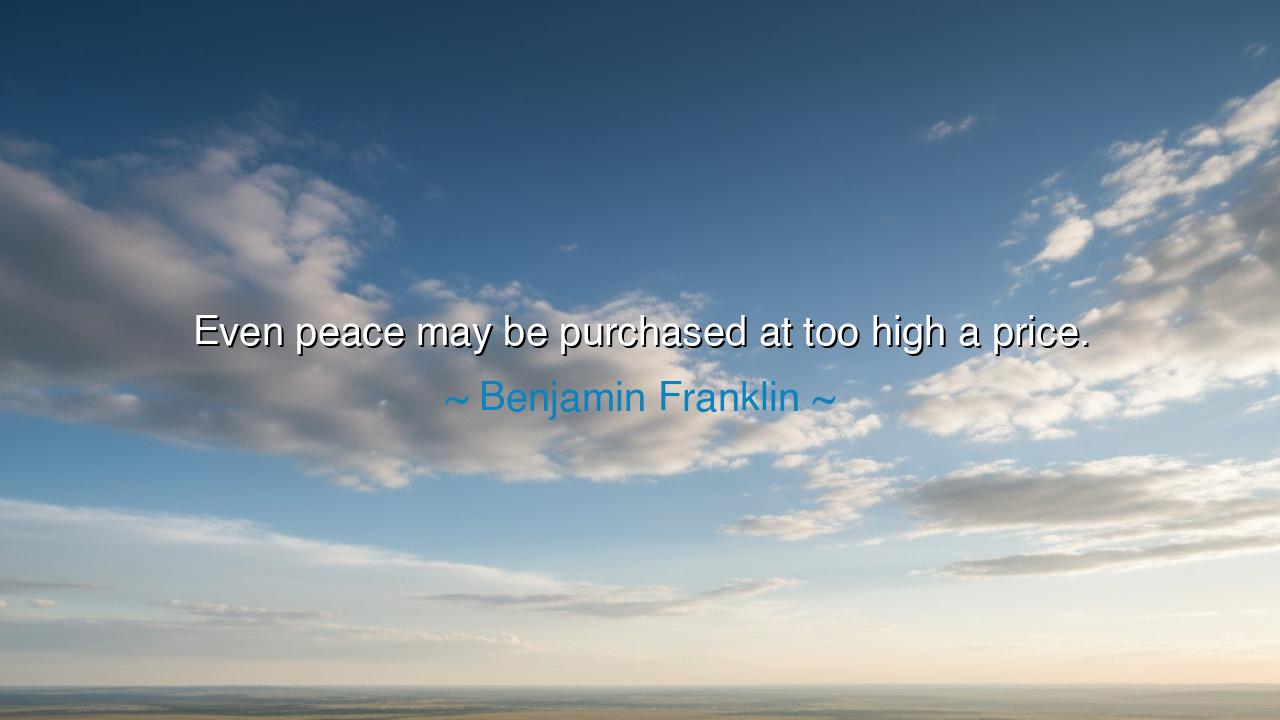
Even peace may be purchased at too high a price.






“Even peace may be purchased at too high a price.” Thus warned Benjamin Franklin, the sage of Philadelphia, a man who knew both the sweetness of liberty and the cost at which it must be preserved. These words, though simple, strike with the weight of ages. For they remind us that not all peace is noble, and not all silence is golden. There are times when the cost of peace is the surrender of freedom, the death of truth, the breaking of the human spirit. Such a peace is no peace at all, but a quiet more dreadful than the clash of arms.
Franklin lived these words in the crucible of the American Revolution. The colonies could have kept their peace with Britain by bowing to unjust laws, paying endless taxes without representation, and accepting the yoke of empire. That would have been the easy peace—the peace of submission. But the price was too high. It was the price of dignity, of self-rule, of the very soul of a people. And so the colonists chose war, not because they despised peace, but because they loved it too much to see it corrupted. They shed blood so that peace might be won honestly, a peace built on liberty rather than servitude.
History offers many such lessons. Think of Czechoslovakia in 1938, abandoned at Munich for the promise of “peace in our time.” The world accepted Hitler’s demands in exchange for the illusion of peace, but the price was betrayal, occupation, and a far more terrible war. Contrast this with the resolve of nations who, though weary of conflict, refused to surrender their core values. Their defiance proved Franklin’s words: peace built on cowardice collapses, but peace defended with courage endures.
Franklin’s wisdom is not only for nations—it is for every soul. How often in daily life do we purchase peace at too high a price? A man may remain silent in the face of injustice to keep the peace, but in doing so he betrays his conscience. A woman may yield her dreams to avoid conflict, but in doing so she sacrifices her very self. Families may bury truth beneath false smiles, workplaces may ignore corruption for the sake of calm, friendships may wither because truth was never spoken. This false peace, bought at the expense of integrity, always carries bitterness in its wake.
To love peace rightly is to balance it with justice. True peace is not simply the absence of conflict, but the presence of what is good, fair, and honorable. Without these, peace is only the silence of fear. Franklin’s warning calls us to courage: to know when to yield for harmony, and when to stand firm though discord arises. For sometimes the price of peace is too dear, and it is better to endure conflict than to live enslaved to a lie.
Let us be clear: Franklin does not glorify war, nor does he counsel recklessness. His life itself was a testament to negotiation, diplomacy, and wisdom. But he reminds us that peace must not be bought with chains. Better a hard struggle for liberty than a soft bed in servitude. Better a storm that cleanses the sky than a stillness that hides rot beneath the surface. This is the peace worth seeking: the peace that is born of truth, not the peace that hides corruption.
The lesson for us is plain: never betray your values for the sake of quiet. In your family, speak truth in love even if it stirs conflict. In your work, stand for integrity even if it costs you comfort. In your nation, demand justice even if it brings unrest. For only in this way can peace be real, not a counterfeit purchased with the coin of your soul.
Therefore, remember Franklin’s words: “Even peace may be purchased at too high a price.” Love peace, but love it rightly. Seek harmony, but never at the expense of truth. Defend it with courage, even if the road is hard. For peace bought with honor is a crown of glory, but peace bought with surrender is nothing but the silence of despair.






AAdministratorAdministrator
Welcome, honored guests. Please leave a comment, we will respond soon